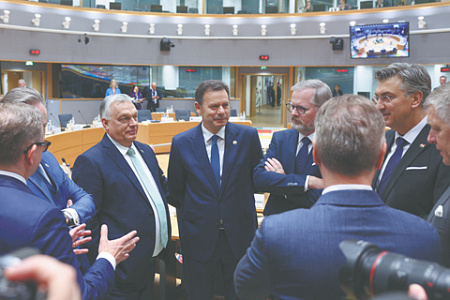
At a two-day summit in Brussels, European Union leaders signaled a significant strategic pivot, confirming that Ukraine’s path to membership is effectively on hold while the war with Russia continues. Instead, the bloc is fast-tracking the accession process for Moldova, which now appears set to overtake its neighbor on the road to European integration. The discussions underscored a sobering reality among EU members: they are preparing for a prolonged confrontation with Russia, with some leaders forecasting the conflict could extend to 2028 or beyond.
Ukraine’s immediate EU aspirations are primarily blocked by a firm veto from Hungary. Prime Minister Viktor Orbán reiterated his government’s unwavering position, telling reporters, “If we take Ukraine into the EU, we take the war with it.” While traditional proponents of Kyiv’s membership—such as Lithuania, Latvia, Estonia, and Poland—continued to advocate for starting talks, they were joined by an unexpected voice in Ireland. However, a breakthrough remains unlikely until after July 1st, when Denmark assumes the rotating EU presidency from Poland. Many hope Copenhagen will be a more effective broker in persuading Budapest to soften its stance.
In stark contrast, Moldova’s EU journey is accelerating. Romanian President Klaus Iohannis confirmed that the first “negotiation cluster” for Moldova’s accession will be formally opened at a high-level summit in Chișinău on July 4th, attended by representatives from the European Commission. This step, greenlit by the European Council last December, marks a tangible advancement, placing Moldova firmly ahead of Ukraine in the integration process after both countries had previously progressed at a similar pace.
The summit’s security focus was amplified by its timing, immediately following a NATO meeting in The Hague. For Ukrainian President Volodymyr Zelenskyy, membership in either the EU or NATO represents the only credible long-term security guarantee. Yet, consensus within the West remains elusive. While NATO officially maintains that Ukraine will eventually join the alliance, some Western officials have suggested that Kyiv’s Euro-Atlantic ambitions complicate efforts to negotiate an end to the conflict with Russia.
A sense of deep pessimism regarding a swift end to the war permeated the Brussels meeting. Lithuanian President Gitanas Nausėda offered a particularly bleak assessment, stating he saw “no light at the end of the tunnel” and warning that the conflict could easily outlast the EU’s current multi-year budget, which runs until 2028. In this grim context, he urged fellow leaders to shift their focus to what he deemed most urgent: preparing a new, 18th package of sanctions against Russia, a topic slated for discussion on the summit’s second day.
